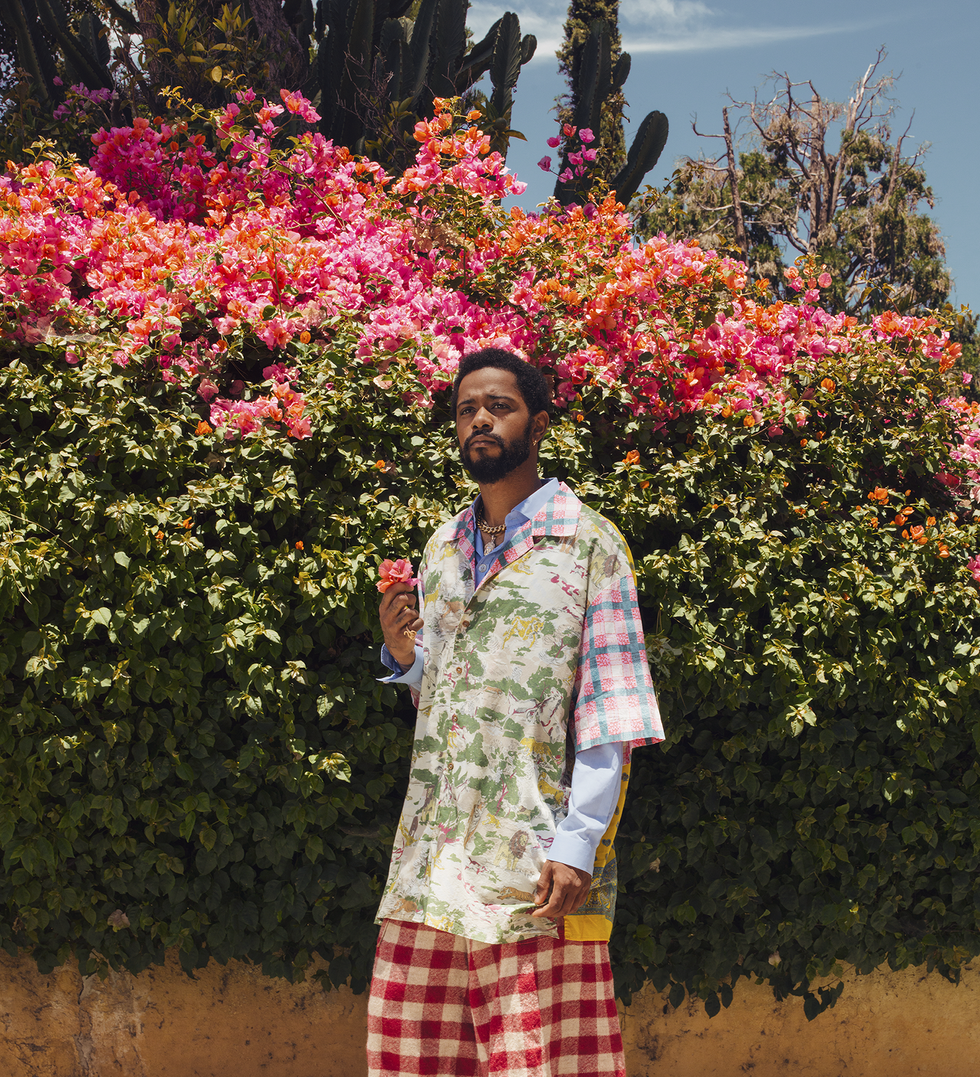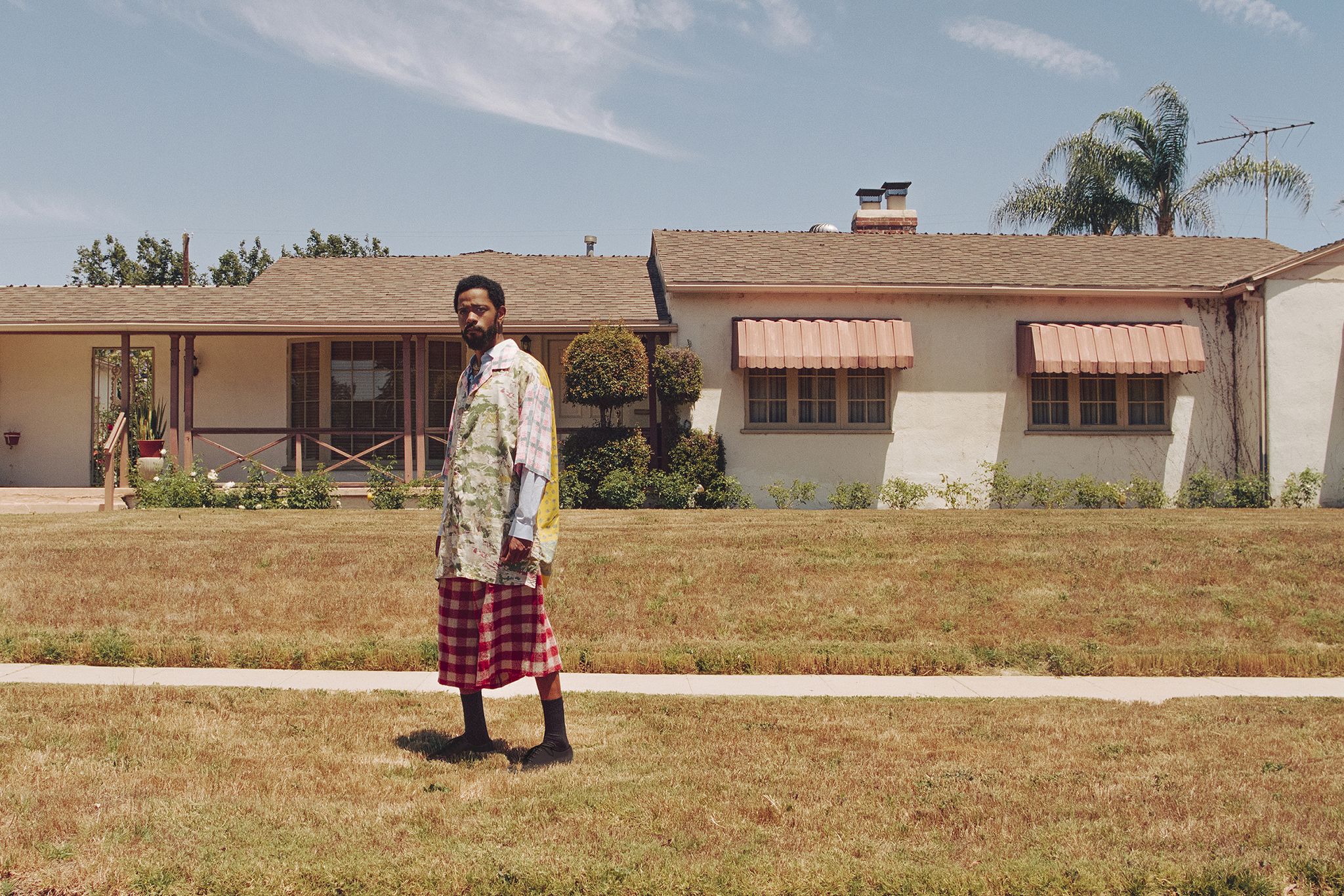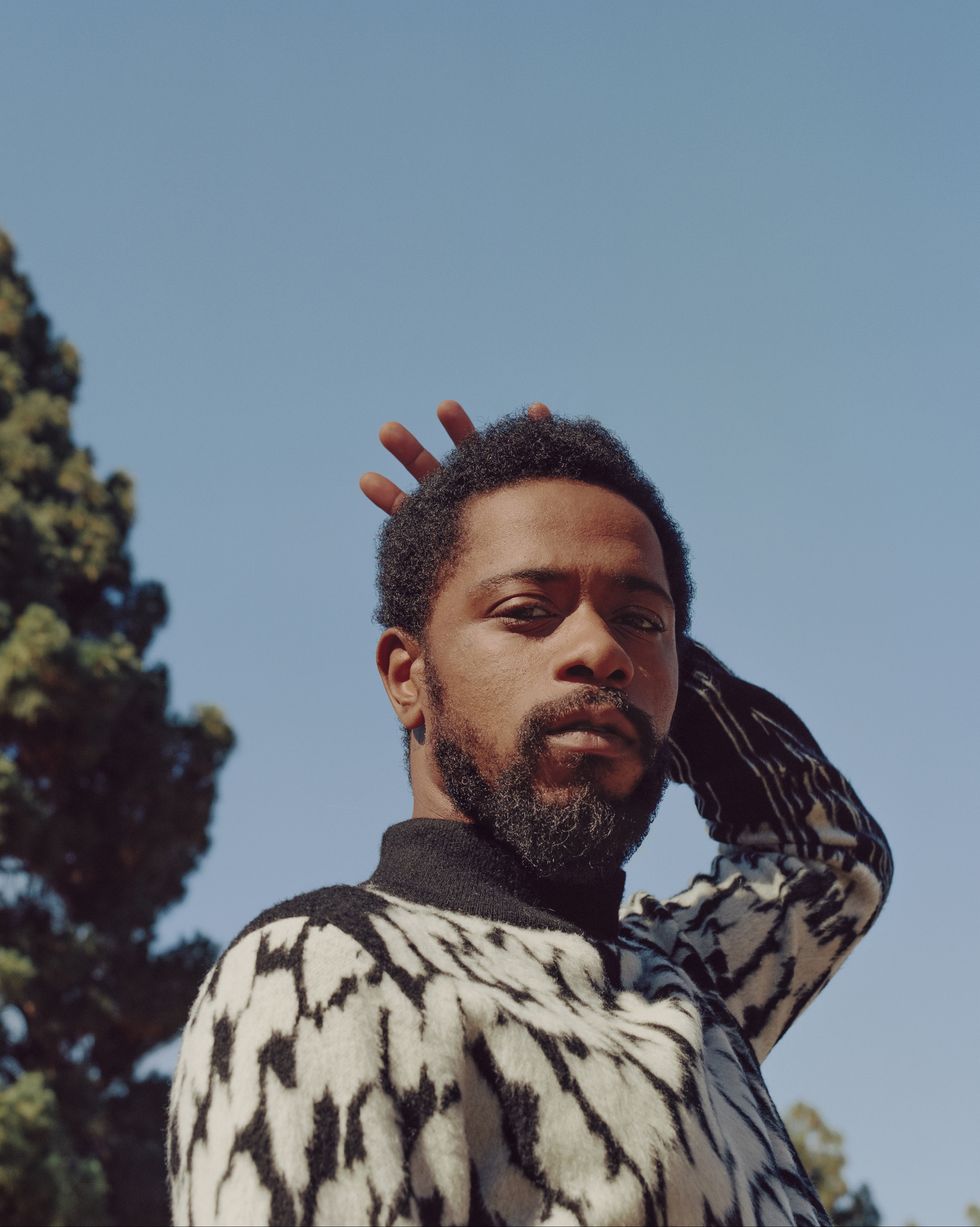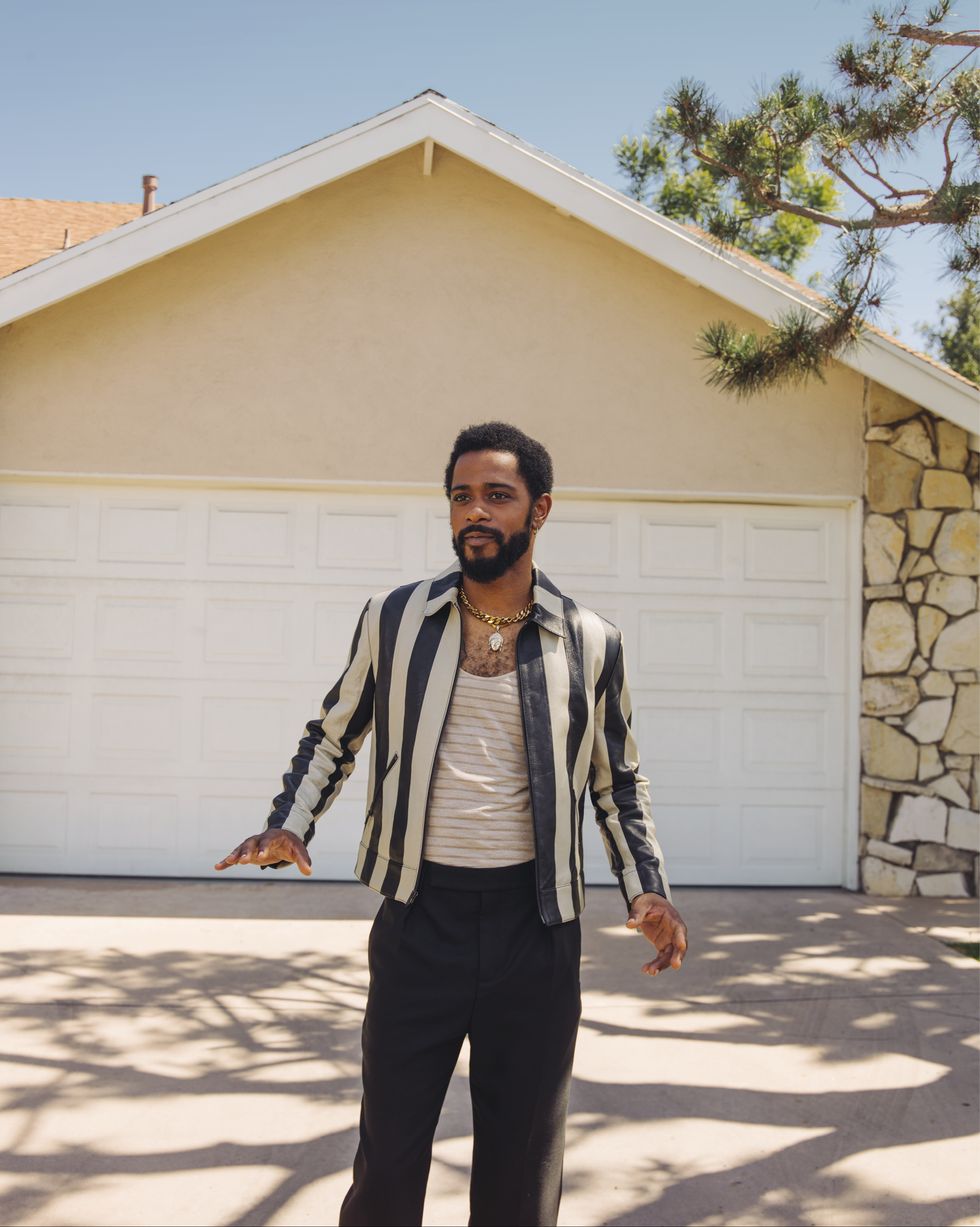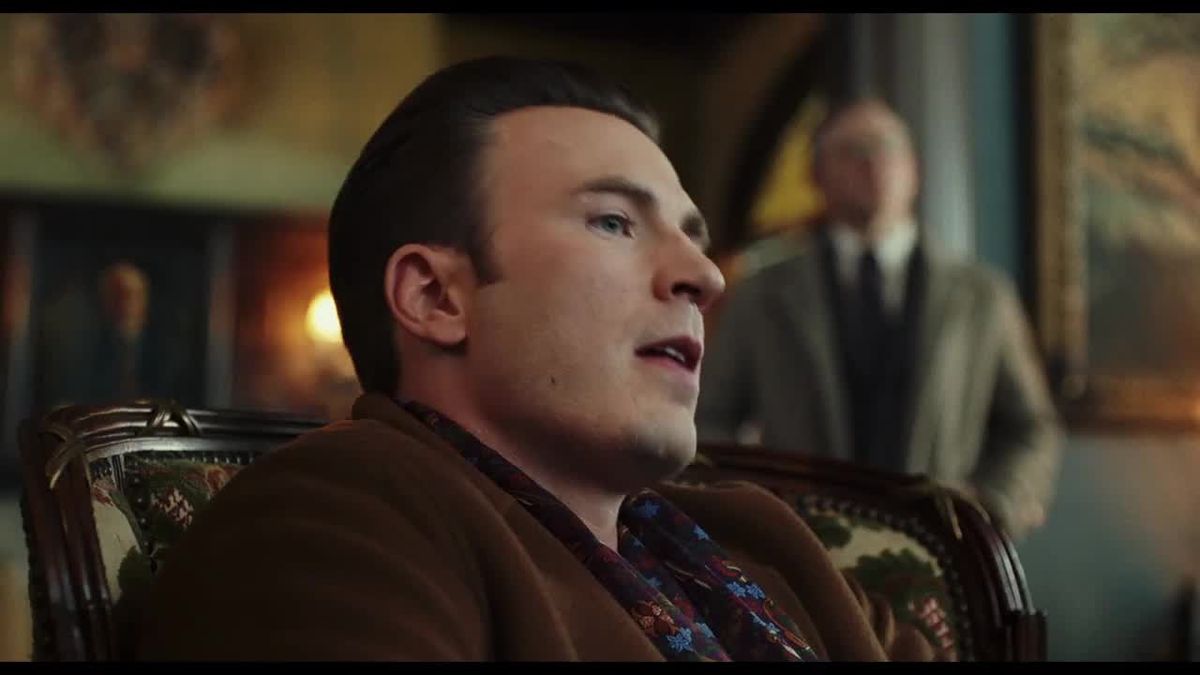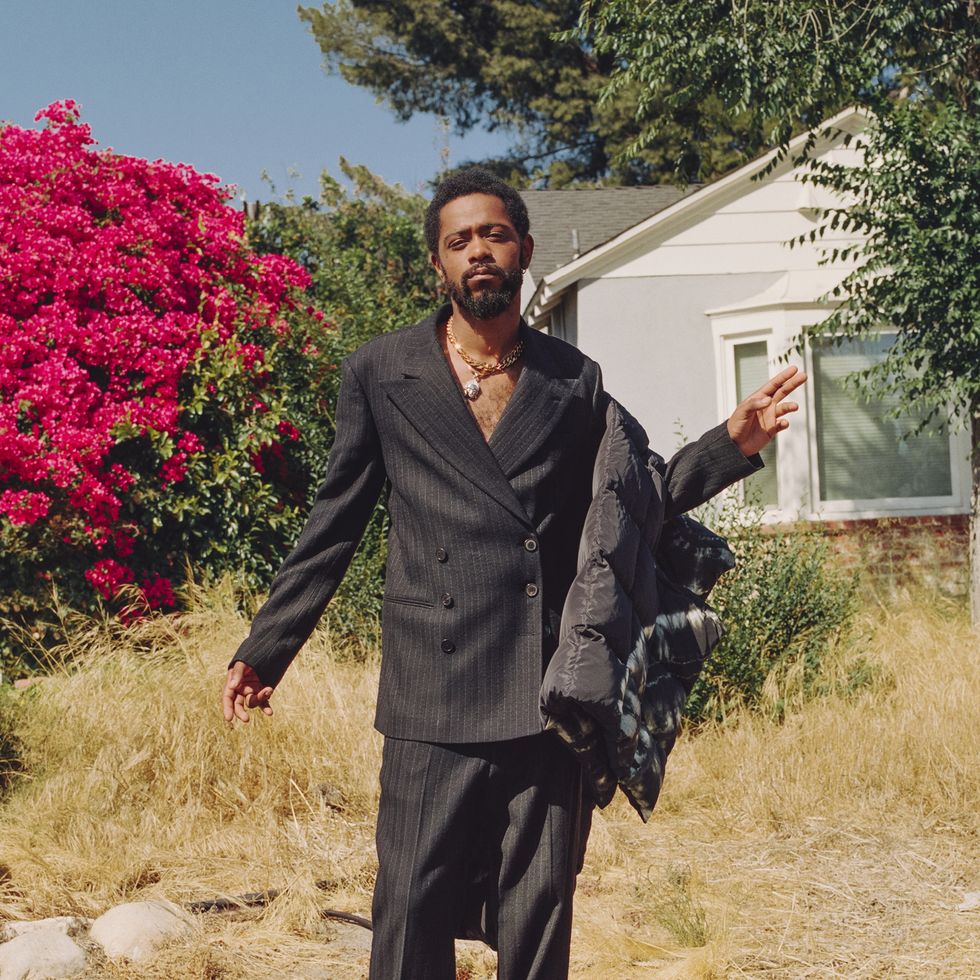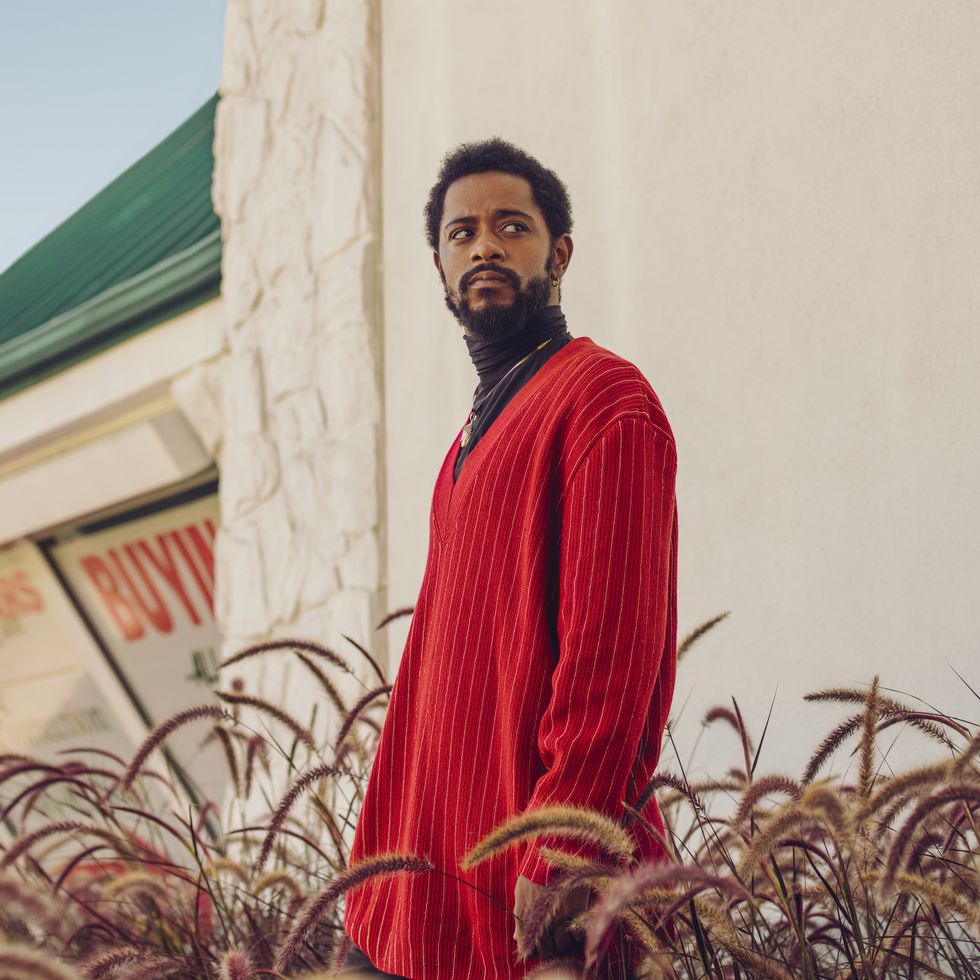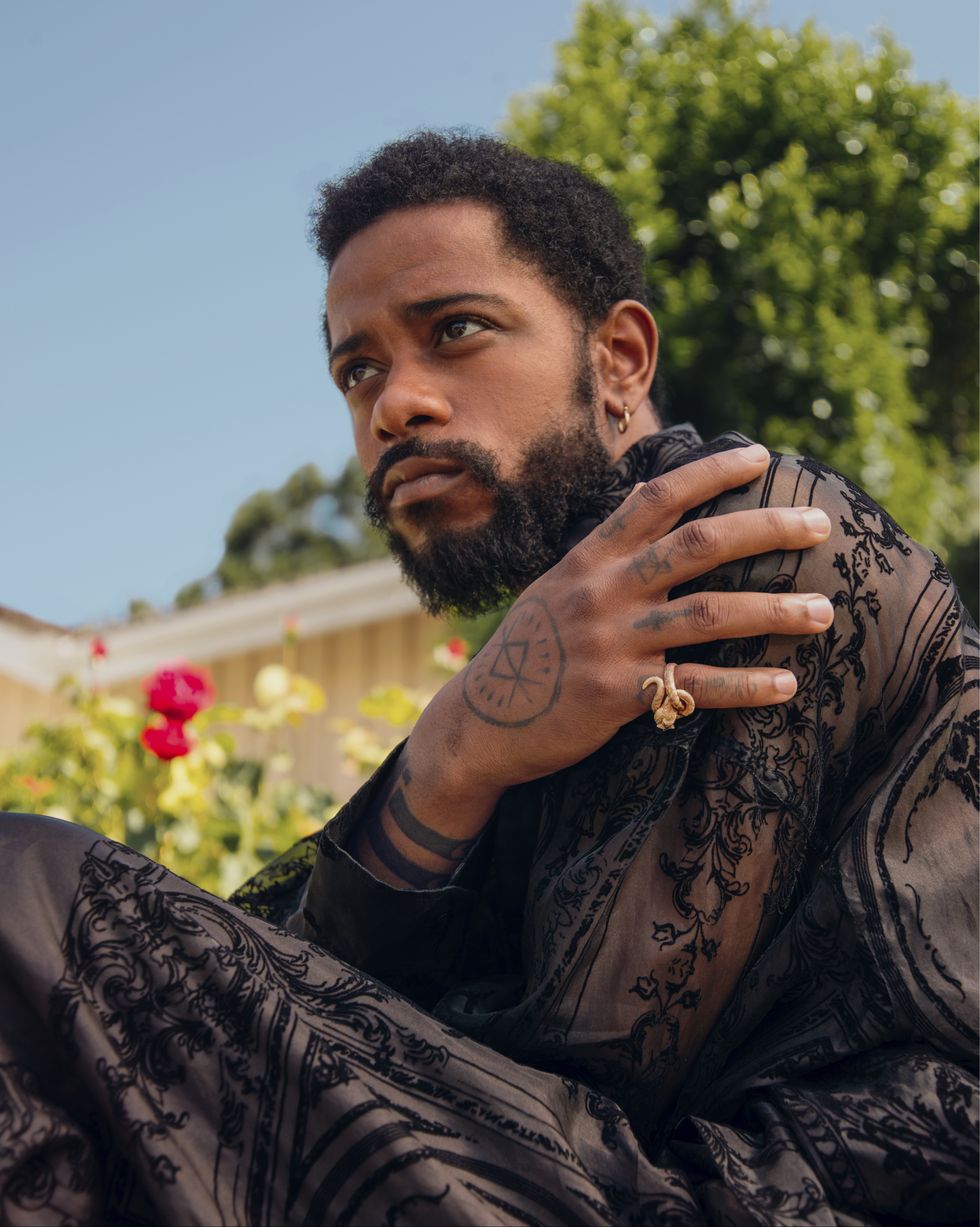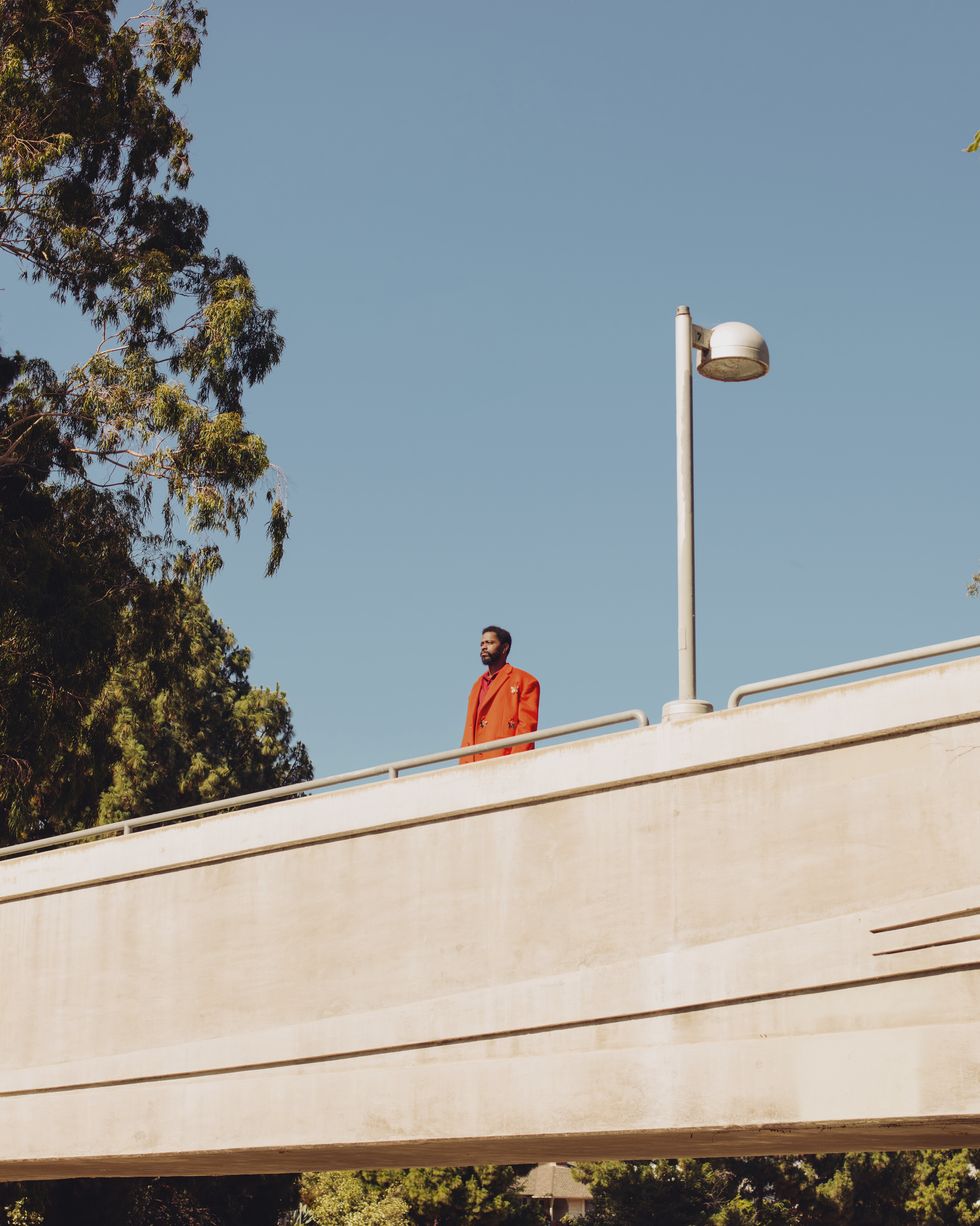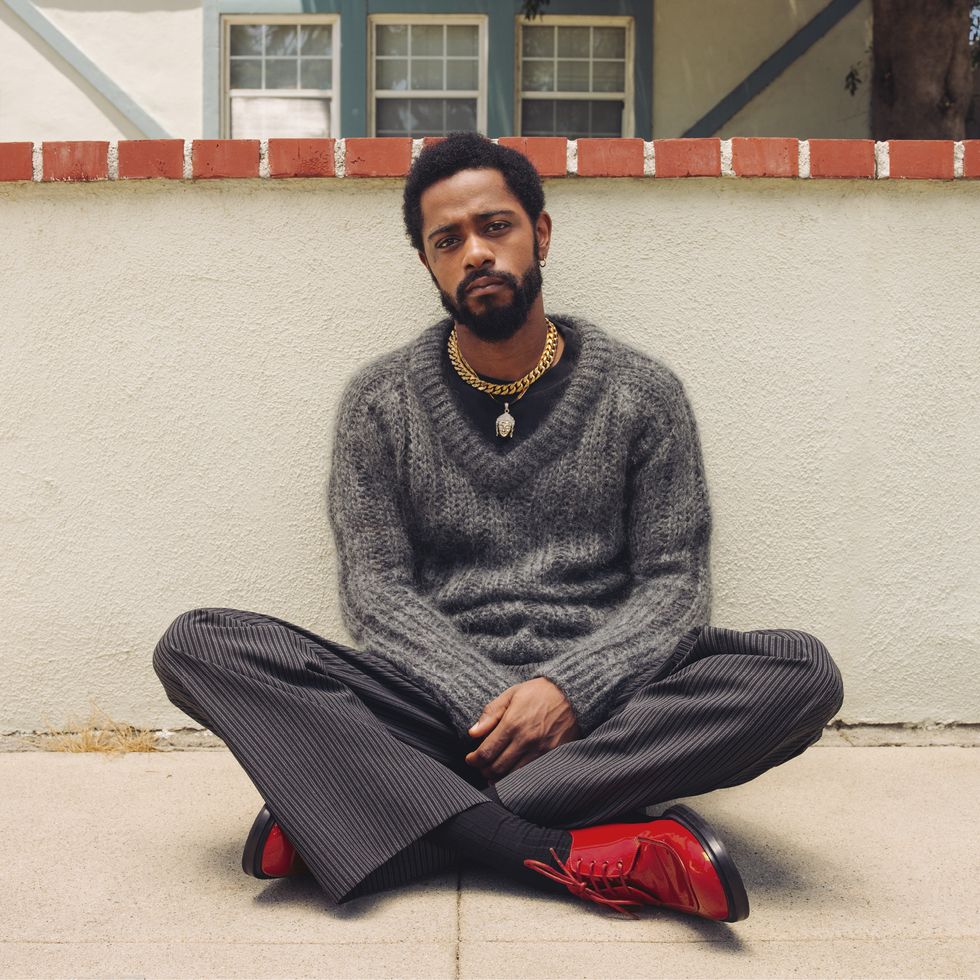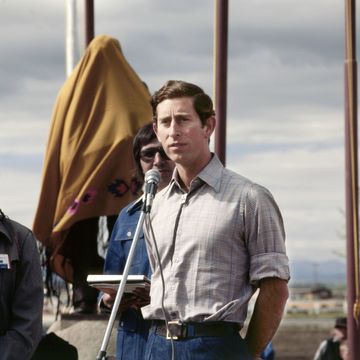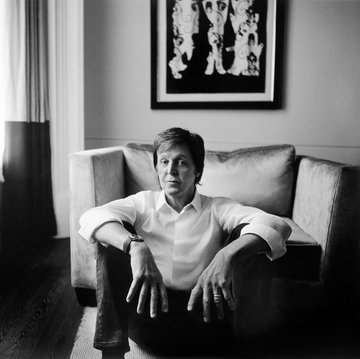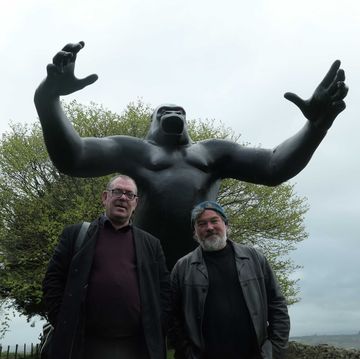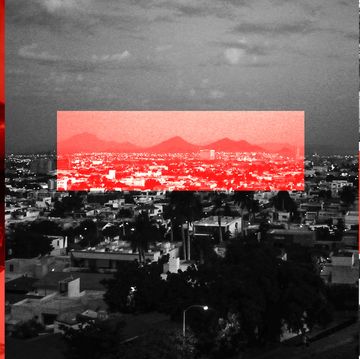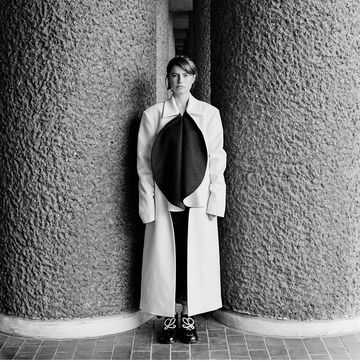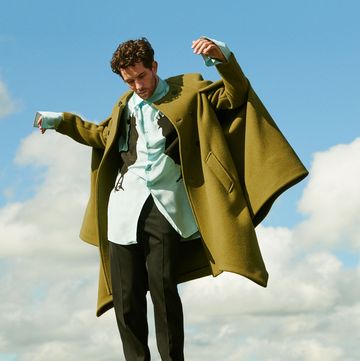Before he was Darius, the trippy one in Atlanta, or Cassius Green, the telesales whizz with the “white voice” in Sorry To Bother You, LaKeith Stanfield was the kid, there’s usually one, standing outside Stater Bros, a Southern California grocery chain, in Victorville, San Bernardino County. It’s one of a cluster of sunbaked towns about an hour-and-a-half northeast of Los Angeles, a region known as the Inland Empire, a name that doth protest. Because life can be tough in Victorville. You could find yourself, at 17, standing in some parking lot, begging for change as people come out with their trolleys. Or collecting cans for the recycling. Or buying candy from the store and selling it at a mark-up.
“The candy worked best,” Stanfield tells me. “People weren’t that sympathetic to someone just fucking panhandling, they wanted to see some agency. I never made much, but I got enough for gas money to get down to LA. My mom would take me. And when she couldn’t, I’d save for the train fare.”
He was going to LA for the same reason a chicken crosses the road in this part of the world — to go to auditions. “I didn’t have any training or anything, I just really wanted to do this,” he says. “But when I got there, I was always so terrified, I’d fuck it up. Like all the time. And I’d end up back outside the store again, the next day, selling candy.”
We’re talking at Stanfield’s home in Studio City, a decade later. He bought it last year for a million-six, according to Zillow (the Zoopla equivalent in the US). Whatever his other achievements, just this alone, this rags to riches story will forever stand him apart from his peers. It’s a story about hope, luck, tenacity, dreams. A story fit for the movies.
He’s a star now, at 28. Though he’s only been acting for seven years, his career trajectory was skyward from the start. He played Snoop Dogg in Straight Outta Compton (2015), and he was the character who actually said “Get out” in Get Out. Then came Atlanta, Donald Glover’s award-winning series about a group of friends trying to make their way in the hip-hop business — shooting begins for season three this autumn. So now, he’s everywhere, often as the lead. This year, he’s in Knives Out, a rollicking whodunnit with Daniel Craig and Chris Evans; later, he’ll play a jewel thief in the much anticipated Safdie brothers movie Uncut Gems, with Adam Sandler; and next year, we’ll see Stanfield as Fred Hampton, the iconic Black Panther leader who was killed by the Chicago police and the FBI, in Jesus is My Homeboy.
This house is proof of how far he’s come. Part-sanctuary, part-playpen, there’s a koi pond out front, and a studio in the back where he’s working on a rap album. We’re sitting at his kitchen table, surrounded by boxes; he’s been too busy to properly unpack. His assistant tends to his baby daughter in the next room, where some of his paintings hang on the walls: one of a black Marilyn, another of his daughter’s mother, his ex-girlfriend, smoking a large blunt.
“I think the design is Japanese-influenced,” he says, indicating the beamed roof and the plant life all around the perimeter. “I love Japanese culture. I got a bunch of Buddhas in my bedroom. And nature, man. It heals all.”
Stanfield developed a special reverence for plants when he worked at a marijuana growhouse before becoming an actor. He raves about them for a while, how they “indicate life and growth”, and how they taste good, most of them. Salads, that’s what he’s into these days. He’s quit the cigarettes. He has a trainer. He wants me to understand that the plants, the house, the Buddhas, the Pall Mall 100s that he leaves on the table just as a reminder — no more! — it’s all part of his new direction in life, a break from his old ways. Because he didn’t come up like this. He came up rough.
“I used to be out on the corner every day with a bottle of Taaka vodka,” he says, citing the cheapest brand on the shelves. “But now, I’m all about self-care. That’s what my album’s going to be about. Living clean and eating right and just trying to be an example to my baby.”
He looks old for his age — the lines around his doleful eyes, the set of his face, as though the rigours of his early years put more miles on the clock, and now the process has begun to slow things down. I try to ask more about his upbringing, it seems so singular, but he’s reticent. It’s a touchy subject, it seems. He won’t say what his parents did for a living, for instance, or where he lived, or with whom, or even how many siblings he has.
“I don’t want to give details,” he says. “We just moved around a lot, mostly between San Bernardino and Victorville [both cities in the Inland Empire] because I had family all over. I just kinda ran around, like a wolf-child. I didn’t have much guidance.”
There was trouble with the cops, “but nothing serious, just childhood mischief”. An old interview mentioned stealing sandwiches from Subway, but he won’t elaborate. “It was mostly just hanging out where I wasn’t supposed to be at. Running around an abandoned building and getting chased by police and thinking it was fun. But I wasn’t punching cops. I was never violent.”
Violence was a part of growing up, though. “We would always fight,” he says of his friends. “People get fucked up, they’re always drunk, it’s nothing new. Right before I came out, I was involved in a little tussle. It’s nothing, we fight every day, no big deal.”
He saw cops throw his friends to the ground, face first. He saw his little sister get pepper-sprayed aged seven. “We was just caught in the crossfire,” he says. “I had guns and tasers pointed at me because I said I knew my rights. They said, ‘Shut the fuck up, you don’t know nothing.’”
But he’s not telling me this to complain, not at all. That’s just how it was where he grew up. His was a poor, black family in a rough neighbourhood, where relations with law enforcement were “botched and difficult.”
“Yeah, it was hard times. We did have some hungry days,” he says. Then he corrects himself, almost indignant. “But it wasn’t that bad! I had the bare necessities! When I was eight, I wanted a pogo stick for Christmas. And I got one! It might have been from Walmart and broke after two jumps, but I got my fucking pogo stick!”
He describes himself as a little performer at home. He’d wear his aunt’s wigs and play-act around the house, doing puppet shows. At dinner, his family would say, “Hey LaKeith, do your British accent!” and he’d perform lines from 101 Dalmatians (his favourite movie), pretending to drink tea, his pinkie aloft. “We viewed British people as very high class,” he says, “the exact opposite of what we were.”
Now that Stanfield is successful, he’s the high-class one in his family. And relatives are coming out of the woodwork to seek him out; cousins he’s never seen. “Not just cousins, but brothers and sisters too,” he says. “They’re like, I’m a Stanfield too! It’s a trip. So I’m trying to be an example to them. Like, I invite them over to eat sushi, because it’s completely different to what they’re used to. But they’re like, ‘What the fuck is this fish and shit?’” He laughs.
“I get it. I was like that when I moved out here too. Like at a restaurant when they show you the wine, I would just grab it.” He grabs a bottle of water on the table and takes a swig. “I didn’t know you’re supposed to see if you like the brand before they pour it.”
Stakes. That’s why he failed his early auditions. It didn’t help that he had no formal acting training to speak of, but the real issue was the stakes were just too high. He’d go from his feral street life in Victorville to a room full of genteel showbusiness types trying to cast a project. And his mind would start to whir: “Like, ‘If I get this my mom will be able to eat and I’ll be able to change her life. Everybody’s life…’ I’d get all in my head about it, and yeah, it would go wrong. And then I’d beat myself up all the way home.”
He never lost faith, though. Stanfield’s self-belief is a thing to behold. “I knew that if they let me swing the bat, I was going to hit eventually,” he says. And he did — eventually. He found a commercial and a modelling agent and even though he never did much modelling, or booked a single commercial, he did land an audition for a short film, Short Term 12, by a young Hawaiian director, Destin Daniel Cretton. It went to Sundance and won the 2009 Grand Jury Prize. And his career might have started at that point. It certainly felt like a break. But nothing happened.
So he went to work at a cannabis growhouse for a couple of years, tending the plants: “That’s why I don’t smoke anymore, I got my fair share back then!” And when the law shut down the operation, he went to stay with an uncle in Sacramento, and sold cable door-to-door for AT&T. Life was foreshadowing art; he’d go on to satirise the sales floor in Sorry To Bother You. It was a period of limbo in which he almost slipped off the radar altogether as an actor.
The reason Stanfield’s sitting in front of me today and not living some blue-collar life in the Inland Empire, is because he signed up to a film board in Sacramento, an online community for film-makers, on the off chance there were any parts he could audition for. He’d never given up on his ambition. His life was chaotic: he didn’t have a phone, he’d changed his email address, his home address, and he’d stayed in touch with precisely none of his old industry contacts.
But that film board, that one tenuous connection to the film world, proved enough. Because when AT&T fired him — “I still had some stuff in the courts” — his early director Cretton found him through that forum. He’d been trying to reach Stanfield for months, to tell him he was about to shoot the feature version of Short Term 12, and he wanted Stanfield to audition. This time it happened; his career began in earnest. Short Term 12 received rave reviews, the young actor’s performance in particular.
Hoping to capitalise, Stanfield moved to Echo Park in LA, where he slept on people’s couches for a while, Cretton’s regularly. Ultimately, he ended up sleeping in his mother’s car, “a janky old Chrysler with no door handles” that he’d park on the street outside Cretton’s apartment.
“I remember one night I woke up in that car because it was so hot — it must have been summer. And I thought, really clearly, ‘One day, I’m not going to be here. I’m going to be in my own house, with my own things, and I’m going to have a new car.’ And here I am, talking to you. I got my house. I got a Tesla right outside.” He shakes his head. “It’s so surreal that it actually happened.”
It was The Purge: Anarchy that turned the tide. Until that point he’d been struggling at auditions; the stakes again, the pressure, it was too much. But that audition was different for some reason. He walked out thinking, “Eh, whatever”, maybe because he was tired that day, or he’d just failed so many times already, he’d stopped caring. They offered him the job before he’d even got home.
His eyes light up as he tells me the story. This was a profound lesson, one of several, as he sees it. One: “don’t worry about the outcome so much”. Two: “don’t give up, because a lot of it is drive and intention, and never fucking stopping. I knew I was going to do this, because it was this or bust.” Three: “learn from the women who raised you”.
“Because that’s where I got my confidence,” he says. “From my mom and from my aunt — she was this Christian lady. They gave me space to be myself and didn’t judge me for it. As a kid it can be hard to feel judged, but I never felt that way. And I saw how these women moved through judgement, too, like when we went to church and people be like, ‘Look what she’s wearing,’ and they’d always navigate it in a confident way. That gave me confidence.”
The challenge for Stanfield was never the actual acting; he’s always had the talent for that, the drive, and soon, the experience as well. He went from The Purge to Selma to Straight Outta Compton to Get Out in what has been an amazing run. His struggle has rather been to reconcile his past life with his new one. It has come up a few times over the years, sometimes with such force that it makes him cry just thinking about it.
He’s crying now at his kitchen table, remembering the day in 2014 when he was shooting an LSD scene in Memoria, a James Franco-led also-ran. They were just about to roll when his mom called to say his best friend from back home had been killed in a drunken fight. He wouldn’t believe it at first, and hung up the phone. But she called back, in tears herself, and it’s the memory of that sound that has set him off today. “It took me a few days to realise it was real,” he says, wiping the tears with his sleeve. “Then I spiralled out, like, really drinking crazy.”
He’d been fighting with his friends from back home. They weren’t impressed by his burgeoning career in LA. “They were like, ‘Come back home, fuck Hollywood, those motherfuckers don’t give a fuck about you, it’s all white people and woop de woop.’ And I’d be offended because not only was it ignorant, but it was like my dreams didn’t matter,” he says. You can see the anger’s still in him. “So I’d be like, ‘Fuck you’, and hang up the phone.”
Now, of course, he regrets leaving things that way. “I try to see his death as a source of energy, whether it be something I can tap into for a scene or as a springboard to really go for it, you know? I kept hearing his voice saying, ‘Go for it, do it for me, you’re alive now, enjoy that shit.’ So like most things in life, it was positive and negative.”
He sits back and breathes. “Whoo! These life lessons keep coming don’t they?”
When LaKeith Stanfield gets recognised on the street, the name they shout out is Darius, his character in Atlanta. It’s his best-loved role, and it would seem, superficially at least, that Stanfield and Darius are similar. Of the three leads in Atlanta — Darius; the weed-dealing rapper Paper Boi (Bryan Tyree Henry); and the sensible manager Earn (Donald Glover) — Darius is the oddball. Quirky, lovable and perpetually stoned, he’s given to strange behaviour and sometimes sage pronouncements. He cites Nick Bostrom, the philosopher. He plays chess with himself.
And Stanfield can often seem similarly eccentric. He’s appeared on red carpets wearing, on different occasions, a balaclava, a chain mail shirt, an enormous wig. He once tweeted out his phone number, saying, “I wanna say Hi to some of you guys.” (Minutes later, he again tweeted: “Whoa. That was really a bad idea”.) He says Donald Glover offered him the role at a club called No Vacancy in Hollywood where he was drunk and dancing with himself, “as if I was having a romantic dance with someone else”. All very charming, all very Darius.
And yet, there’s a gentleness to Darius that Stanfield lacks. He seems caught between two versions of himself — the clean-living Buddhist artist in LA and the surly street kid from Victorville who keeps surging to the surface. At one point, he cuts our interview short because he wants to work out; we can reconvene on Saturday, he says. But come Saturday he doesn’t show up, or answer his phone. “It was a family situation,” he tells me later. “I didn’t even have my phone on me.” Except he posted a jokey video on Instagram that evening which he quickly deleted.
He deletes a lot of posts, Stanfield; they reveal his inner conflict. In June of last year, he posted a now-deleted homophobic rap on Twitter: “Take that choke chain back, that’s some gay shit / Fag, I don’t really want to brag but I’m straight rich.” He later apologised, insisting he was just playing a character. But recently, that “character” seemed to recur, in an angry complaint about being obliged to tip in California. After a swell of comments saying, “This ain’t it”, he replaced it with a shot of him wearing a Buddha pendant.
When was the moment, I ask him, when you realised you’d made it? When did it really hit home you weren’t in Victorville anymore, you were a movie star, literally living your dream?
He tilts back in his chair and thinks. “Oh I know exactly,” he says, grinning. “It was War Machine with Brad Pitt. That movie was really important for me, actually.”
It was 2016, and he was in Abu Dhabi, playing a soldier in David Michôd’s satire about the war in Afghanistan. From the start, it had been an experience like no other.
“We was on the other side of the world, a place I had never gone to before, with sand dunes and a whole different culture, there’s people with burqas on, they got different ethics there. And I’m training to be a marine, so my body’s going through a transformation. The sun is hot, I’m blacker than I’ve ever been, flyer than I’ve ever been, feeling better than ever, and here I am with an M5, in a movie with Brad Pitt, and they talking about ‘rolling’. And I just started crying. Tears of happiness. Because I’m like, damn, this shit just hit me! I’m in a movie for real!”
All those days selling candy, all the train rides to LA, all the blown auditions and self-
flagellating walks around Echo Park lake, his late friend, his weeping mother… And now look — he was doing it. There was Brad Pitt right there. This was as real as it got. His fellow actors had been acting all tough, the way marines are supposed to be, but then Stanfield started crying, and they all reverted to being sensitive actors again.
“Up until that point we were all trying to act macho — as macho as actors can act, anyway, ‘Whoop whoop!’ and all that. And there I am in tears, and niggas are coming around me saying, ‘It’s all good, let it out, that’s some real shit!’ Then they say, ‘Action!’ and I’m wiping the tears, and putting mud on my face and we went straight into the scene.”
Which was?
“Oh, we had to do an insurgency. I was on a rampage, basically. So anybody that I see I’m popping them.”
From panhandling to Brad Pitt movies in six years is nothing to sniff at. LaKeith Stanfield’s story will always stand apart from his peers for sheer grit and will and personal transformation. And he’s only 28. The changes he’s wrought in his life have been epic, and change is still very much underway. You can feel it in person; there’s something crackling and kinetic about him that makes him hard to predict, and at times hard to love. But he’s compelling to watch, both on screen and off, if only to see him wrestle with his old self.
“I think the things I experienced that are positive have been passed down, like the unflinching love from my mother,” he says. “But the negative things I experienced are non-existent in my life. I don’t allow for them in my space. I don’t even like being loud — it triggers me. I don’t like arguments, none of that stuff.”
As a parent, he thinks a lot about the environment he’s creating here, in his home. “I want her to experience life in a way I wasn’t able to. But I also want her to understand challenges. I don’t want to be that Joe Jackson dad that hits his kids, but there ain’t no free rides in life. You got to work hard for everything. I remember when baby first came out I was like, ‘Don’t just give her the bottle. Make her crawl to it.’”
He laughs and slaps the table. “That’s what life’s about, right? Struggle. There’s not a person you can meet who hasn’t had some struggle to deal with. But we’re still here, aren’t we?” He looks to me with a smile. “No matter what, we’re still able to somehow stride into life’s consequences unflinchingly.”
Knives Out is released on 29 November
Styling by Matthew Henson
The Esquire 'Style & Fashion' issue is out now. Subscribe here.
Like this article? Sign up to our newsletter to get more articles like this delivered straight to your inbox
